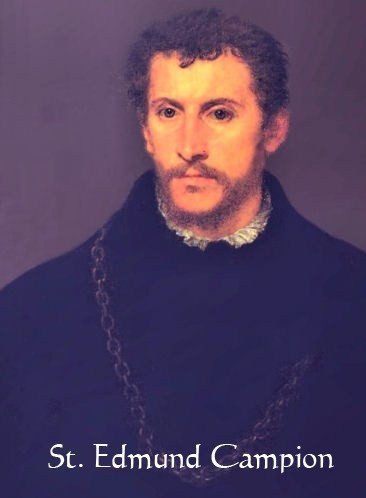“the truth that makes men free is for the most part the truth which men prefer not to hear.”

For Catholics, Elizabethan England was a police state. It was illegal for Catholic priests to celebrate Mass, hear confessions, teach Catholic doctrine, or for lay people to shelter priests. The English college in Rome formed priests who were sent back to England to serve the few remaining Catholics and convert as many souls as possible.
Edmund Campion was a brilliant scholar at Oxford University. He was even noted for special patronage by the Queen. But Campion was drawn to the Catholic faith and faced a choice.
Conversion meant exile. But staying at Oxford meant putting worldly success ahead of God. He chose to become a Catholic and leave England. In 1581 he returned as a Jesuit priest, to minister to the underground Catholic Church.
A year after his arrival, Anthony Munday, posing as a servant, betrayed Campion to the government. Campion was captured and imprisoned.
Munday visited Campion in prison and they spoke at length. Campion encouraged Munday to confess his sins and come back to the Church.
But the traitor refused to repent and left the prisoner's cell angry and upset.
One of the prison guards was deeply moved by the kindness and gentleness Campion showed towards his betrayer. He became convinced that the Catholic faith must be the true Christian faith, and was thus converted.
After a mock trial, Campion was condemned to a terrible death. Yet he refused to renounce his faith. He forgave his executioners, praying for the queen with his last breath.
Above the door of the English College in Rome are inscribed the words “I have come to set the earth on fire.” Forty four of its former students were martyred in England during this time of persecution.
Two thousand years ago, Christ came to set the world on fire. He brought a message of love for God that would affect how we lived our lives and lead us to build a society founded on justice and virtue. Through His disciples the flame of that message has spread throughout the world, toppling oppressive governments and bringing light to a darkened world.
But it did not come without cost. Eleven of the twelve apostles were martyred. They were followed by countless others through the centuries who valued their lives less than the message contained in the fire.
But the fire that once engulfed much of the West has cooled considerably. Places that once blazed high are now little more than smoldering ruins. And so Jesus calls us, reminding us of the mission of the Church. We are here to transform the world with the fire of Christian virtue and truth. We are here to contend against the evil and wickedness that would separate us from God’s love.
And yes, there will be a cost. The Truth may cost us friends and loved ones, perhaps even our lives, but it is a Truth that must be served if we are to be truly free.
It is time to once again set the world on fire.
Pax Vobiscum
20th Sunday in Ordinary Time





